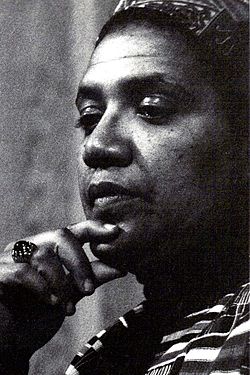Audre Lorde Quote
Somewhere, on the edge of consciousness, there is what I call a , which each one of us within our hearts knows that is not me. In america, this norm is usually defined as white, thin, male, young, heterosexual, christian, and financially secure. It is with this mythical norm that the trappings of power reside within this society. Those of us who stand outside that power often identify one way in which we are different, and we assume that to be the primary cause of all oppression, forgetting other distortions around difference, some of which we ourselves may be practicing.
Audre Lorde
Somewhere, on the edge of consciousness, there is what I call a , which each one of us within our hearts knows that is not me. In america, this norm is usually defined as white, thin, male, young, heterosexual, christian, and financially secure. It is with this mythical norm that the trappings of power reside within this society. Those of us who stand outside that power often identify one way in which we are different, and we assume that to be the primary cause of all oppression, forgetting other distortions around difference, some of which we ourselves may be practicing.
Related Quotes
They took one look at me,And hated my black face.They took one look at me,And decided on my fate.They took one look at me,And forced an unknown fear.They took one look at me,And caused the shed of tea...
N'Zuri Za Austin
Tags:
acknowledge, all lives matter, black lives matter, bleed, bleeding, blood, conflict, erase, faith, harmony
About Audre Lorde
Audre Lorde ( AW-dree LORD; born Audrey Geraldine Lorde; February 18, 1934 – November 17, 1992) was an American writer, professor, philosopher, intersectional feminist, poet and civil rights activist. She was a self-described "Black, lesbian, feminist, socialist, mother, warrior, poet" who dedicated her life and talents to confronting different forms of injustice, as she believed there could be "no hierarchy of oppressions" among "those who share the goals of liberation and a workable future for our children."
As a poet, she is well known for technical mastery and emotional expression, as well as her poems that express anger and outrage at civil and social injustices she observed throughout her life. She was the recipient of national and international awards and the founding member of Kitchen Table: Women of Color Press. As a spoken word artist, her delivery has been called powerful, melodic, and intense by the Poetry Foundation. Her poems and prose largely deal with issues related to civil rights, feminism, lesbianism, illness, disability, and the exploration of Black female identity.
As a poet, she is well known for technical mastery and emotional expression, as well as her poems that express anger and outrage at civil and social injustices she observed throughout her life. She was the recipient of national and international awards and the founding member of Kitchen Table: Women of Color Press. As a spoken word artist, her delivery has been called powerful, melodic, and intense by the Poetry Foundation. Her poems and prose largely deal with issues related to civil rights, feminism, lesbianism, illness, disability, and the exploration of Black female identity.
